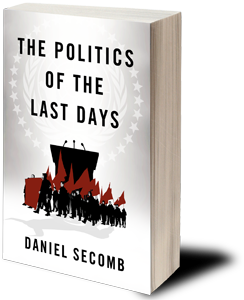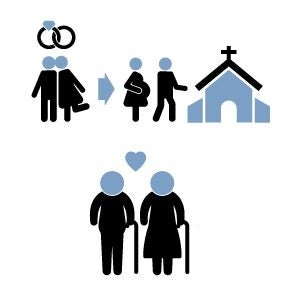Studies show that religious freedom gives Americans of all religions—and even those who have no religion—benefits that include:
- A stronger economy
- Happier families
- A safer society
Without religious liberty, you don’t have religious influence, and without religious influence, America doesn’t reap these benefits. This is the finding of modern economists, sociologists, psychologists, and criminologists.
And if we lose religious liberty? Then we will almost certainly forfeit the advantages of religious influence. That is why religious freedom is literally the key to America’s future.
REASON 1: A STRONGER ECONOMY
“The total current savings to U.S. society from America’s religiousness is $2.67 trillion per year.”
This conclusion comes from Dr. Rodney Stark, one of the world’s foremost social scientists. He combed through his own extensive surveys and the scholarly work of other researchers, and tallied up the economic benefit of religious influence to America.
But Stark isn’t alone:
- After analyzing data from 59 nations over an 18 year period, two leading Harvard economists found that “religion affects economic outcomes” positively.
- They attributed this to “religious beliefs that influence individual traits such as honesty, work ethic, thrift and openness to strangers.” Most productive were Christian beliefs in God and an afterlife.
- The conclusion of a massive study in the Journal of Monetary Economics was that, “On average, religious beliefs are associated with good economic attitudes, where good is defined as conducive to higher per capita income.”
Why the connection? The great cultural anthropologist Max Weber, economist and moral philosopher Adam Smith, along with virtually all major American Founders, saw a close link between religion, morality, and prosperity.
Religion, they found, supplies the inner motivations and external order necessary for a free economy to thrive.
But what if religious freedom is restricted? What if religion is limited, condemned, and stigmatized, and its “exercise” made less free? It follows that fewer citizens will be strongly religious. Religion’s guidance of Americans will weaken, and its benefits will drain out of our economy.
REASON 2: HAPPIER FAMILIES
Marriages where even one spouse attends religious services are less than half as likely to break up.
Family is the foundation of society. Marriage is the cornerstone of that foundation. And religion is the cement holding it all together. Decades of research have shown that religion contributes to:
- Fewer divorces: Marriages where one or more spouses attend religious services are less than half as likely to divorce.
- Less domestic violence and abuse: Such marriages suffer from much less abuse.
- More emotional harmony: The more religious the husbands, the happier the wives, and the more religious the wives, the happier the husbands.
- More marital contentment: Surveys show that, in general, religious couples today have higher benchmarks for marital contentment.
- Better father-child relations: Multiple university studies show much better relationships in religious families; more hugs, more love, tighter bonds.
- Better mother-child relations: Some research tracked relationships for years to strongly confirm this.
- Fewer out-of-wedlock children.
- Far less underage sexual activity.
But what if public schools and government edicts drive a wedge between children, on one hand, and their parents’ faith on the other? The data would warn that any such “liberation” of our children from religion risks cracking the very foundation of our nation: our families.
REASON 3: A SAFER SOCIETY
The strong evidence is that religion, and therefore religious freedom, is critical to both domestic safety and national security.
Domestic Safety
247 research studies published between 1944 and 2010 reported that religion had a positive effect on reducing crime and delinquency.
Research also showed that the higher a city’s rate of church membership, the lower its rate of rape. In fact, crime statistics from America’s major cities—even data as far back as the 1920s—showed that the higher a city’s church membership rate, the lower its rates for all of the following crimes:
- Burglary
- Larceny
- Robbery
- Assault
- Homicide
Religious influence also has a positive effect on reducing crime in inner cities. One study of impoverished males in inner-city Philadelphia and Chicago showed that religious attendance at a high level was associated with the following:
- Reducing the likelihood of drug use by 46%
- Reducing the probability of dealing drugs by 57%
- Reducing the likelihood of committing a non-drug related crime by 39%
Government welfare programs could not compare to the positive effect of religious attendance on crime in this study.
National Security
Recent surveys reveal that a substantial majority of service members claim that religion is either “important” or “very important” to them.
Gen. George Washington established the chaplain’s corps in the Continental Army for that reason, stating the importance of religion to a strong fighting force.
President Franklin Roosevelt personally made sure WWII soldiers were provided with Bibles. And President Harry S. Truman’s commission to study religion’s effect on military performance found that “the idea of a moral law which is based on religious convictions and teachings” was “essential” for “strengthening [service members’] effectiveness as an instrument of our democratic form of government.”
If America ceases to protect religious liberty, religious influence will decline, and America will become a more dangerous, less secure place to live.
FAITH WORTH SAVING
Noted researcher Dr. Patrick Fagan states, “No other dimension of life in America—with the exception of stable marriages and families, which in turn are strongly tied to religious practice—does more to promote the well-being and soundness of the nation’s civil society than citizens’ religious observance.”
Yet today, religious liberty in America is under legal attack. This should be a cause for concern.
As Fagan points out, “To work to reduce the influence of religious belief or practice is to further the disintegration of society.”
Open religious faith is good for America. In fact, it is essential to America’s wellbeing and freedom, and it is key to America’s future. Religious influence, and therefore religious liberty, is worth saving.
Source: First Liberty
 Register your interest for Daniel Secomb's new book, "Politics of the Last Days"
Register your interest for Daniel Secomb's new book, "Politics of the Last Days"
Daniel's new book explores the integral and fascinating role that politics will play in the end times.
He demonstrates that political philosophy is actually underpinned by biblcal principles and that by examining the political history of the past can give us a fascinating glimpse into how Biblical end times events will unfold.
Be sure to sign up with your name and email address to be notified of updates and the upcoming release date of the book.





















